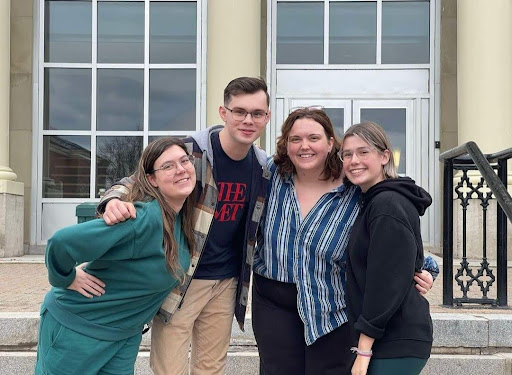

At the age of five years old, fourth-year student Emily Bessey was diagnosed with Juvenile Idiopathic Arthritis (JIA) which for Bessey causes mobility struggles, living with high and manageable amounts of pain and surgery to help with joint damage.
Aside from the physical symptoms of her disability, she has also been met with judgement and invalidation. She said that people have told her many times that JIA is “not real and doesn’t exist.”
Bessey is now the president and founder of the new St. Thomas University Disability Society and hopes to create space for community and advocacy for students with disabilities.
“We talk a lot at STU about the importance of community and supporting your community and I think this is just another way that we’re able to do that for a particular group of students,” said Bessey.
The new society was officially launched at the beginning of November, but the idea has been brewing for years. Bessey said she has wanted to start a disability society since her first year at STU.
Coming in as a first-year, Bessey said she was unsure if she would find a community of people with similar experiences as her.
“When I came to university … I knew Accessibility Services was here and I talked to them before I came to STU,” she said. “But, I was like, ‘am I gonna have people around me that want to support me?’”
With the new society, she can now create a supportive environment for others and Bessey said there is already excitement for the club.
While volunteering at the open house this semester, Bessey said even prospective students approached her to share their happiness, which was “exciting to see.”
Currently the executive team consists of Bessey, Alex Dawson as vice president, Ian Curran as the social media and events coordinator and Cameron Rouse as treasurer — all students with disabilities that share the same vision as Bessey: to provide a space to fellow students sharing similar life experiences.
Bessey said that having a disability can feel “isolating.”
“I think there’s real power in community and solidarity, specifically for us as disabled students,” she said. “It can feel like you’re the only person in the world that’s ever experienced these things or felt this way.”
Rouse lives with chronic pain that has remained undiagnosed despite going through testing over the last five to six years.
She also echoed Bessey’s feeling of isolation.
“I think any person’s journey in getting a diagnosis or living with a disability, there is so much isolation. I think the society calls directly to answer that,” they said.
Rouse said that aside from isolation, students with disabilities on the STU campus specifically have other barriers to deal with. They mentioned uneven sidewalks, non-functioning handicap buttons for doors and elevators breaking down as problems on campus for people with mobility issues.
STU does have an Accessibility Office to address the needs of students with disabilities, however, Rouse said the society hopes to offer a more social space for those students.
“Our society has great opportunities to [work with] the Accessibility Office,” she said. “But I think there’s something to the fact that we’re social people.”
“Though they work hard to make accommodations, there’s also community — and that’s what keeps people moving.”
While Rouse and Bessey both see the new disability society as a space for connection, they also envision the society as a place to hear students’ needs and concerns regarding disability support on campus and act as a collective to both educate and improve accessibility at STU events.
Although it is the STU Disability Society, Bessey said that she wants all students to feel welcome to come to their events to learn and participate.
“Something that I’ve struggled with my whole life is that I think there’s a real image associated in people’s brains of what they think disability looks like and I don’t think that I as a person necessarily fit that image [for] people,” she said.
“Disability has no look and has no one experience and all of these people deserve to be considered and feel included.”
With files from Suzanne Shah
